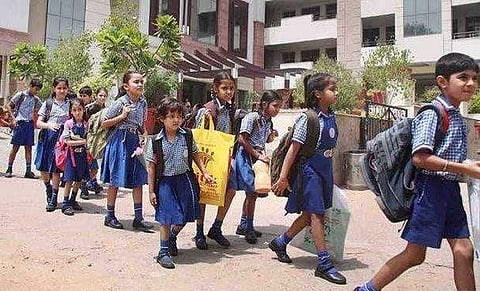

At least 80 per cent children in India between the age group of 14-18 years reported lower levels of learning during COVID-19 pandemic than when physically at school, according to a UNICEF report.
Noting that repeated school closures have led to alarming inequities in learning opportunities for children in South Asia, the report by the United Nations International Children's Emergency Fund (UNICEF) pointed out that 76 per cent of parents of students aged 5-13 years reported drop in learning levels during remote learning.
"School closures in South Asia have forced hundreds of millions of children and their teachers to transition to remote learning in a region with low connectivity and device affordability. Even when a family has access to technology, children are not always able to access it. As a result, children have suffered enormous setbacks in their learning journey," George Laryea-Adjei, UNICEF Regional Director for South Asia, said.
In India, 42 per cent of children between 6-13 years reported not using any type of remote learning during school closures.
"This means they have not used any of the following for remote learning since the schools shut down: textbooks, worksheets, phone or video calls, WhatsApp to access materials or connect with teachers, learning programmes on radio or TV, YouTube videos, video classes, learning applications, home visits by teachers and private tuitions, community teaching at local locations, other websites," the report said.
The research found that student-teacher engagement, when regular and reciprocal, is a strong predictor of success in children's learning, especially for younger students.
However, the surveys found that most students had little or no contact with their teachers after the schools closed.
"At least 42 per cent of students aged 5-13 years and 29 per cent of students aged 14-18 years are not in touch with their teachers at all," it said.
The UNICEF called upon the governments to prioritise safe reopening of all schools while also ensuring that children are able to pursue quality learning remotely if necessary.
Assessment of learning levels and ensuring catching up by students, vaccination of teachers and support staff, expanding investments in education, working with private sector and civil society organisations in improving connectivity and creating high-quality, preparing multilingual remote learning content tailored to students' needs, are among the recommendations made in the report.
"The safe reopening of schools must be considered on utmost priority for all governments. Parallelly, investing in teachers will ensure that teachers and schools can adapt to all situations. The more teachers are trained, equipped and supported on distance and blended learning, the better they will be able to reach all their students, added George Laryea Adjei.
"This is a critical investment we need to make for children as the region gears up for future waves of COVID-19. We need to build systems which can weather any storm and keep children learning, no matter the circumstances, he added.
The UNICEF report also stated that in Sri Lanka, 69 per cent of parents of primary school children reported that their children were learning less or a lot less. In Pakistan, 23 per cent of younger children did not have access to any device that could support remote learning, it said.
Talking about school reopening, UNICEF India representative Yasmin Ali Haque said prolonged school closure due to COVID-19 has caused many children to miss out on learning, social interaction and playtime which are essential to their overall development and well being.
Safe and gradual reopening of schools in India is a welcome move as children learn best in person and this will help prevent further learning loss and alleviate some of the pscychological stress they are facing, she said.
"The safety element is critical. Teachers, parents, children and communities can work together along with the government, to put in place the protocols needed for children to return to schools and learn in a safe environment. We need to focus on rapidly building capacities of teachers who can support learning both in the classroom as well as at home more effectively. We have examples from states like Bihar, where several devices are being purchased for students to support learning. Now is the time to plan and put the structures in place to transition children back into learning. We need to build back better and stronger, Haque added.
